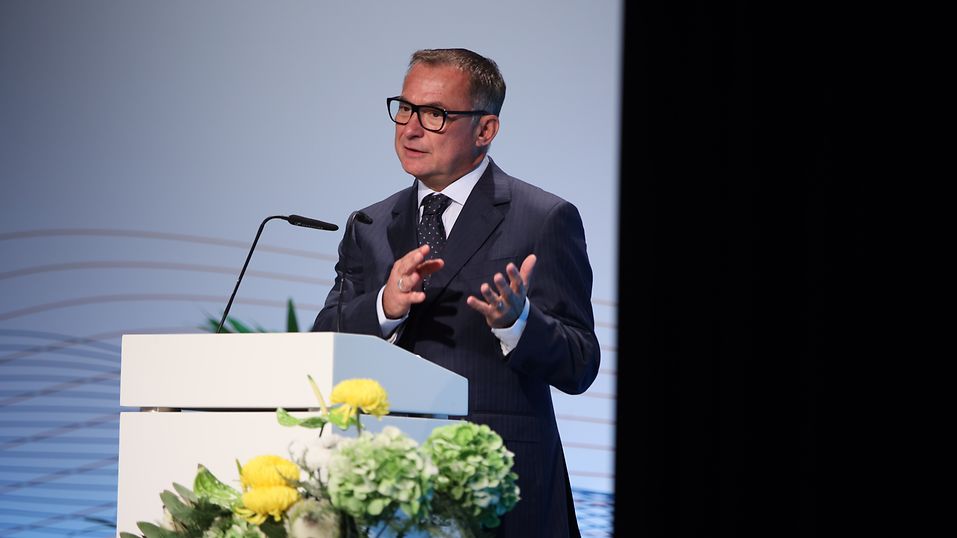Speaking to an audience of around 300 guests at the Bundesbank’s third Financial Centre Conference, Bundesbank President Joachim Nagel said that Germany needed structural reform to overcome its weak growth. At the conference, decision-makers from the world of politics, business and finance discussed how Germany and Europe could finance their future, with a focus on the topics of innovation, defence and retirement provision. According to First Deputy Governor Sabine Mauderer, European capital markets therefore need to work better together and facilitate cross-border investment: “The need for private financing is greater than ever.”
Promoting growth and competitiveness
In a moderated discussion with Christian Sewing, CEO of Deutsche Bank, Mr Nagel described the structural reforms needed in Germany. One step he believes the Federal Government needs to take is to increase the supply of labour – which would be achieved, for example, by improving incentives and opportunities to work more and by promoting targeted labour migration. According to Mr Nagel, reforms need to be fast-tracked: “We need to significantly pick up the pace of reform. We are too slow to implement.”
Asked about the potential of the Savings and Investments Union (SIU), Mr Nagel stressed that the initiative would help deepen Europe’s capital markets. “We currently have 27 different supervisory authorities and sets of insolvency rules in Europe,” the Bundesbank President said. From the Bundesbank’s perspective, he continued, a crucial aim for the SIU was to harmonise and integrate European supervisory structures more strongly.
Strengthening sovereignty through the digital euro
“Today, around two-thirds of all card payments in the euro area are made through non-European providers such as Visa or Mastercard – meaning they go mostly through North American servers,” the Bundesbank President stressed. This poses risks: “Imagine we were cut off from one of these servers,” Mr Nagel continued, explaining that Europe does not currently have a suitable, stand-alone cloud infrastructure for digital payments. The digital euro would make Europe more independent from non-European providers. It would also bring greater efficiency and lower costs, especially in retail.
Mauderer: “Dare to have more of a capital market culture”
According to First Deputy Governor Mauderer, increased competitiveness in Europe requires there to be sufficient risk capital in Europe. In her view, start-ups can put even established competitors under pressure with their new ideas and approaches. However, it is especially those young and innovative firms that often lack funding opportunities – or the money comes from the United States or Asia. “Europe therefore needs a deep and liquid capital market,” she demanded.
According to Ms Mauderer, having more of a capital market culture could also help ease the pressure on the pay-as-you-go pension system caused by the increasing pace of population ageing. She cited the Swedish pay-as-you-go system as a good example. Sweden added a funded defined-contribution component to its system. “The Swedish model has strengthened the financial situation of the population and the extent of retirement provision,” the First Deputy Governor remarked. In addition, the country, with its 10.5 million inhabitants, had launched 492 initial public offerings (IPOs) over the past ten years, while Germany, with 84 million inhabitants, had launched only 104. Ms Mauderer welcomed the fact that the Federal Government was currently examining how the capital market can be used to fund parts of the pension system.
Security as an economic necessity
“Investors don’t just expect an attractive economic environment. Investors expect protection for their investments, including military security,” Ms Mauderer stressed. She therefore sees expanding defence capabilities as necessary from a security policy and economic perspective: “You can only defend yourself if your economy is strong. And you can only have a strong economy if you are able to defend yourself.” Against this background, she explained how it was important to clarify how defence capabilities could be financed.
Exchange on defence, retirement provision and growth
The topics of defence, retirement provision and growth were also discussed in panels during the event. First, the panellists discussed what had to happen in order for the envisaged boost in funding to effectively increase European defence capabilities. They also examined the extent to which a stronger Europe in military terms could also make the continent more innovative.
Second, the speakers discussed whether focusing more heavily on the capital market could stabilise the German pension system. In a cross-country comparison, they assessed the extent to which greater financial literacy could contribute to households becoming more involved in the capital market. The event was moderated by journalist Melinda Crane-Roehrs.
